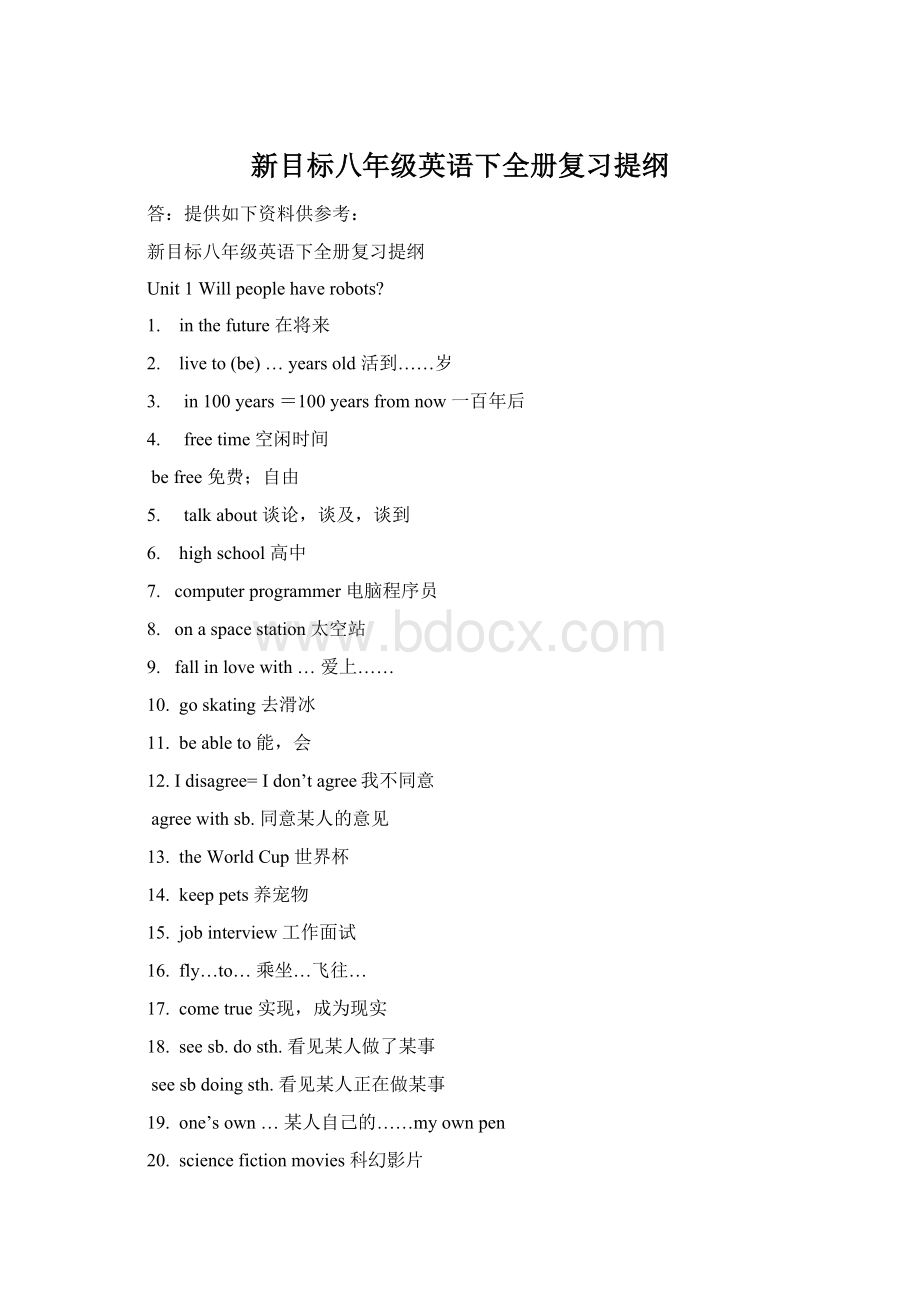新目标八年级英语下全册复习提纲Word下载.docx
《新目标八年级英语下全册复习提纲Word下载.docx》由会员分享,可在线阅读,更多相关《新目标八年级英语下全册复习提纲Word下载.docx(37页珍藏版)》请在冰豆网上搜索。

17.
cometrue实现,成为现实
18.
seesb.dosth.看见某人做了某事
seesbdoingsth.看见某人正在做某事
19.
one’sown…某人自己的……myownpen
20.
sciencefictionmovies科幻影片
21.
help(sb.)withsth.帮助(某人)做某事
22.
hundredsof
数百,成百上千的
23.
thesameas和……相同
24.
wakeup醒来;
唤醒
26.
trytodosth.试图做某事,尽力做某事
27.
getbored变得厌倦
28.
overandover(again)一次又一次,再三地
29.makepredictions做预测
30.predictthefuture预测未来
31.lookfor寻找
32.theheadof….的老板
33.makesbdosth使某人做某事
34.beusedby被用
35.lesspollution更少的污染
36.livealone单独居住
37.beindifferentshapes形状不同
38.asareporter作为记者
39.some...others...一些……另一些……
40.liveinanapartment住在公寓
41.dresscasually穿得很随意
本单元目标句型:
1.Whatdoyouthinklifewillbelikein100years?
2.Therewillbefewertrees、morebuildingsandlesspollutioninthefuture.
few(修饰可数名词);
less(修饰不可数名词)表示几乎没有,有否定之意,;
more二者都可以修饰。
3.Willkidsgotoschool?
No,theywon’t/Yes,theywill。
4.Predictingthefuturecanbedifficult.
5.Ineedtolooksmartformyjobinterview.
6.Iwillbeabletodressmorecasually.
7.IthinkI’llgotoHongKongonvacation,andonedayImightevenvisitAustralia.
8.Whatwillteenagersdoforfuntwentyyearsfromnow?
9.Thatmaynotseempossiblenow,butcomputers,spacerocketsandevenelectrictoothbrushesseemedimpossibleahundredyearsago.
本单元语法讲解一般将来时
表示将要发生的动作或存在的状态。
常与表将来的时间连用,本时态标志词:
1.含tomorrow;
nextweek/month/year;
inthefuture;
in2020;
2.in+一段时间;
3.howsoon;
3.祈使句句型中:
or/andsb.willdo
4.在时间/条件状语从句中,如果从句用一般现在时,主句用将来时
表示将来时的常见句式:
1.用bedoing表示将来:
主要是表示按计划,安排即将发生的动作,常用于位置移动的动词;
如come,go,leave,arrive,fly,move,start,等,也可以用其他动词。
I'
mdoingmyhomeworktomorrow.
2.begoingto表示近期、眼下就要发生的事情。
如:
Heisgoingtowritealettertonight.
3.begoingto表示已有迹象表明即将发生的某种情况。
Lookattheclouds.It'
sgoingtorain.
4.在有条件从句的主句中,多用will,如:
例Bequick,oryouwillbelate.=Ifyoudon’tbequick,youwillbelate.
Unit2WhatshouldIdo?
keepout不准进,阻止进入
arguewithsb.和……争吵
argueaboutsth.为……争吵
outofstyle过时的,不时髦的
instyle流行的,时髦的
callsb.up=ringsb.up=call/ring/phonesb.给…..打电话(代词放中间)
givesb.sth.=givesth.tosb.
给某人某物
(bring,lend,pass,sell,send,show,take,等与give一样)
atickettoaballgame一张球赛的门票
(与ticket类似的名词有:
ananswertothequestion,akeytothedoor)
talkonthephone在电话中/用电话交谈
payfor付……的款
apart-timejob一份兼职工作
borrow…from从……借(进)……
lend…to把……借(出去)给……
12.
asksb.forsth.向……要……
asksb.forhelp向某人求助
asksb.(not)todosth.要求某人(不)做某事
bakesale面包或糕饼售买活动
TeenTalk青少年论坛
buysb.sth.=buysthforsb.买……给……
thesame…as和……一样的……
tellsb.(not)todosth.告诉某人(不要)做某事
wantsb.todosth
=wouldlikesb.todosth.
想某人做某事
findout发现;
查明;
核实
dosth.wrong做错某事
invitesb.todosth.邀请某人做某事
beangrywith生……的气
pass/failthetest通过考试/考试不及格
getonwell/badlywith和……相处得好(差)
25.
haveafightwithsb.=fightwithsb.
与某人打架
fit…in/into…把…安排在…
not…until直到……才……
as…aspossible=as…assb.can尽可能……
29.
complainaboutdoingsth抱怨,埋怨做某事
complaintosb抱怨某人
30.
takepartin=joinin
参加(某种活动/集会)
join参加团体、组织
31.
allkindsof
各种各样的
32.
compare…with…
拿……和……比较
33.
ontheonehand一方面
34.
ontheotherhand
另一方面
35.
byoneself=onone'
sown某人自己,独自地
36.besurprisedat…对…感到吃惊
37.getatutor请家教
38.include(doing)sth包括(做)某事
39.givesbsomeadvice(不可数)/suggestions(可数名词)给某人一些建议
40.find+it+形容词+todosth.”表示”发现做某事…
41.organizedactivities有组织的活动
42.bebusywithsth忙于某事
bebusydoingsth忙于做某事
43.learntodo学做某事
44.underpressure在压力下
45.bethesameageassb.=asoldassb.和某人同龄
46.it'
stimeforsb.Todosth.=it'
stimeforsth.
该到做某事的时候了
47.take…from…to…把……从……带到……
48.writesb.aletter=writealettertosb=writetosb.给某人写信
49.pushsbtoohard强逼某人
50.forgetsth忘记某事
51.leavesthsomewhere(某地)将某物忘在某地
1.What’swrong(withyou)?
/What’sthematter?
2.WhatshouldIdo?
我该怎么办
3.Youcouldwritehimaletter.你可以给他写封信.
Youshouldsaysorrytohim.你应该给他道歉.
4.Theyshouldn’targue.他们不应该争吵.
5.Whydon’tyoutalktohimaboutit?
=Whynottalktohimaboutit?
=Youshould/couldtalktohimaboutit.
=What/Howabouttalkingtohimaboutit.=You’dbettertalktohimaboutit.
6.Theparentstrytofitasmuchaspossibleintotheirkidslives.
本单元语法总结:
情态动词有can(could),may(might),must,haveto,shall(should,will(would),dare(dared),need(needed),oughtto等。
情态动词无人称和数的变化;
不能单独使用,必须与其后的动词原形构成谓语
1、can,could
1)表示能力(体力、知识、技能)。
Canyouliftthisheavybox?
(体力)
此时可用beableto代替。
Can只有一般现在时和一般过去式;
而beableto则有更多的时态。
I’llnotbeabletocomethisafternoon.
2)表示请求和允许。
-----CanIgonow?
-
----Yes,youcan./No,youcan’t.
此时可与may互换。
在疑问句中还可用could
2、may,might
表示请求和允许。
might比may语气更委婉,而不是过去式。
否定回答时可用can’t或mustn’t,表
示“不可以,禁止”。
----Might/MayIsmokeinthisroom?
----No,youmustn’t.
3、must,haveto
1)表示必须、必要。
Youmustcomeintime.
在回答引出的问句时,如果是否定的,不能用mustn’t(禁止,不准),而用needn’t,don’thaveto(不
必).----Mustwehandinourexercisebookstoday?
----Yes,youmust.----No,youdon’thaveto/youneedn’t.
2)must是说话人的主观看法,而haveto则强调客观需要。
Must只有一般现在时,haveto有更多的时
态形式。
1.heplayisn’tinteresting,Ireallymustgonow.
2.IhadtoworkwhenIwasyourage.
3)表示推测、可能性(只用于肯定的陈述句)
1.You’reTom’sgoodfriend,soyoumustknowwhathelikesbest.
4、Need
既可以作情态动词,也可以作实义动词,但是它们的用法不同。
1)need作情态动词,后跟动词原形。
表示“需要”或“必须”,通常用于否定句和疑问句。
1.Youneedn'
tdoitagain.你不需要再做了。
2.Heneedn'
tworryaboutit.这件事他无需担心。
2)“need”作为实义动词时,通常用法是:
人+need+todo
物+need+doing
物+need+tobedone
1.Weneedtotellhimthetruth.我们需要告诉他真相。
2.Theflowersneedwatering.这些花需要浇水。
3.Hisleathershoesneedstobemended.他的皮鞋需要修补。
5、shall,should
1)shall用于第一人称,征求对方的意见。
Whatshallwedothisevening?
2)should表示劝告、建议和命令。
Youshouldgotoclassrightaway.
六、will,would
1)表示请求、建议等,would更委婉。
Will/Wouldyoupassmetheball,please?
2)表示意志、愿望和决心。
Iwillneverdothatagain.
Unit3WhatwereyoudoingwhentheUFOarrived?
1.infrontof
在……(范围之外)的前面
inthefrontof
在……(范围之内)的前面
barbershop
理发店
getoutof
到……外,离开
walkdown/along沿……走
callthepolice
报警
takeoff(飞机)起飞;
脱(衣帽)
anunusualexperience
一次不寻常的经历
theMuseumofFlight航空博物馆
takephotos照相
10.apoliceofficer警官
runaway跑开,逃跑
walkaround
四处走走
thinkabout考虑,思考,回想
BeijingInternationalAirport
北京国际机场
atthedoctor’s
在医务室,在诊所
16.inthehospital
在医院工作
inhospital生病住院
17.inhistory
在历史上
19.hearabout/of
听说,得知
20.asksb.(not)todosth.
叫某人(不要)做某事
21.insilence
沉默不语
22.takeplace(有计划、有安排)发生
happen(意外)
发生
sbhappentodosth某人碰巧做了某事
sthhappenstosb某事发生在了某人的身上
theWorldTradeCenter世贸中心(美国)
24.inspace
在太空
25.anationalhero
民族英雄
26.allovertheworld
=aroundtheworld全世界
27.Youarekidding.你在开玩笑
28.followsbtodosth跟随某人做某事
29.shoutat向某人大喊(不礼貌)
30.shoutto向某人喊叫(担心听不见)
31.jumpdown跳下
32.climbupthetree爬树
33.inatree在树上(外来的物)
34.onatree在树上(树本身的物)
35.havefun=enjoyoneself玩得愉快
36.bedestroyedby被毁坏
bekilled被杀害
37.havemeaningtosb对某人有意义
38.cookdinner煮饭
39.cuthair理发
40.outsidethestation在车站外
41.sleeplate睡懒觉
42.lastabout22hours持续约22个小时
42.dosth.Forthefirsttime第一次做某事
43.notall并非所有
44.everydayactivity日常活动
本单元目标句型:
1.WhatwereyoudoingwhentheUFOlanded?
当不明飞行物着陆时,你正在干啥?
2.Whilemymotherwascooking,IwaswatchingTV.当妈妈正在做饭时,我在看电视。
3.IwaswalkingdownthestreetwhenaUFOlandedrightinfrontofme.
4.Youcanimagehowstrangeitwas.
5.Ifollowedittoseewhereitwasgoing.
6.Isn’tthatamazing!
7.Shedidn’tthinkingaboutlookingoutsidethestation.
8.Iwassotiredthismorning.Itwasdifficulttogetoutofthebed.
本单元语法讲解
过去进行时(PastProgressiveTense)
句型主语+was/were+V-ing…
否定句主语+was/were+not+V-ing…
一般疑问句was/were+主语+V-ing…
过去进行时表示过去某一时刻或者某段时间正在进行或发生的动作,常和表过去的时间状语连用,标志性词语:
atthattime/moment,(at)thistimeyesterday(lastnight/sunday...),at+点钟+Yesterday(lastnight/Sunday...),when,while引导的时间状语从句
1.Shewasdoingherhomeworkat8:
30yesterdayevening.
(昨天傍晚八点半她正在做家庭作业。
)
2.WhenIgotupthismorning,Motherwaspreparingbreakfastinthekitchen.
(今天早上我起床时妈妈正在厨房里准备早餐。
—“Mother…。
”是主句,“when…,”是从句。
When和while的区别
1、when,while都有“当……时候”的意思。
when既可表示某一点时间,也可以表示某一段时间。
在when引导的时间状语从句中,其谓语动词可以是延续性的,也可以是非延续性的,可与主句中的谓语动词同时发生,也可在其后发生。
例如:
1、Iwasjustreadingabookwhenshecameintomyroom.她走进我房间时,我正在看书。
2、Wereyouwritingwhentheteachercamein?
老师进来的时候,你在写信吗?
3、Whenhewasachildhewasalwaystryingoutnewideas.他小时候就常常试验一些新的设想。
2.while只能表示某一段时间,不能表示某一点时间。
在while引导的时间状语从句中,其谓语动词只能是延续性的,而且也只能与主句中的谓语动词同时发生或存在。
1、WhileJimwasmendinghisbike,LinTaocametoseehim.正当吉姆修自行车时,林涛来看他。
2、Youcan’tdoyourhomeworkwhileyou’rewatchingTV.你不能一边看电视一边做家庭作业。
3、另外,when和while的区别还在于:
while引导的时间状语从句多用进行时态,而when引导的时间状语从句多用一般时态。
1、Whiletheyweretalking,thebellrang.正在他们谈话的时候,上课铃响了。
2、Iwasdoingmyhomeworkwhenmymothercamebackhomeyesterdayevening.昨天晚上妈妈回家的时候,我正在做家庭作业。
过去进行时和一般